Comparison of 40-foot deck saloon yachts Part I: Living on several levels
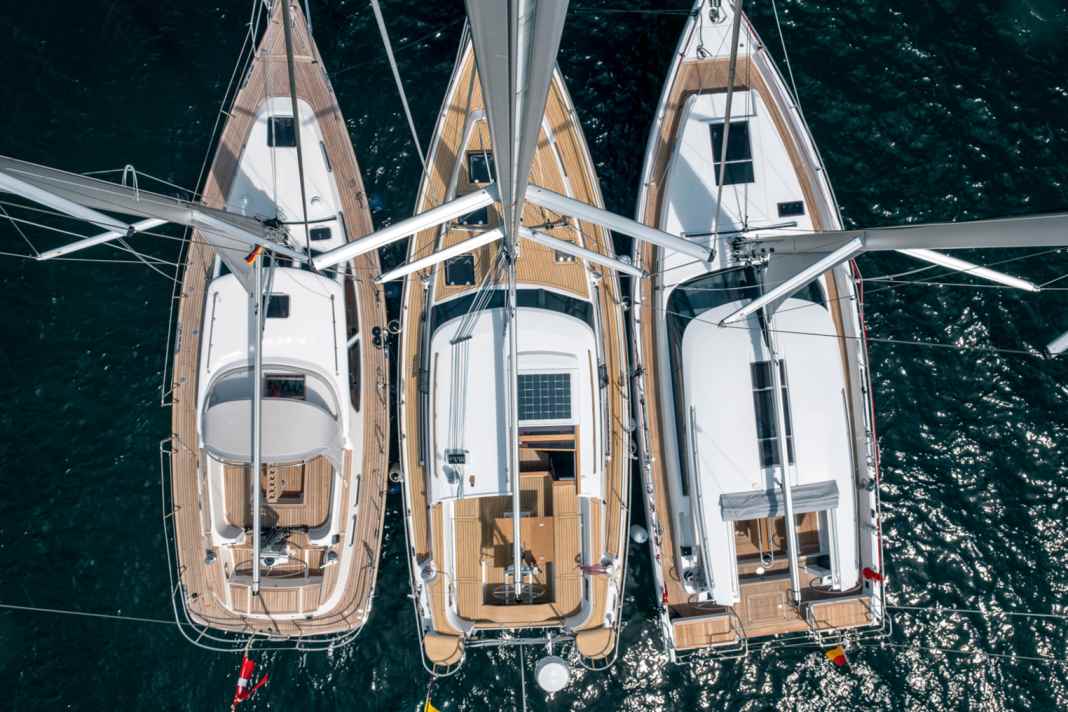





For a long time, things were quiet in the rather small niche of deck saloon yachts. Then the Moody DS 41, the smallest of the series belonging to Hanseyachts, appeared at the last boot Düsseldorf with much fanfare and tinsel. This raised the question of what other boats the Dixon design with its striking deckhouse and modern hull lines could be compared with. In fact, the unusual room concept is unrivalled: The cockpit floor and saloon are on one level, just like on a catamaran. And yet: the Moody (see YACHT 11/20 for test) is and remains a true deck saloon yacht. And there are certainly more of them, even in similar sizes.
Possible brands are quickly named: Sirius, Nordship, Regina Yachts, CR-Yachts, Wauquiez - just to name a few. And there are other manufacturers who also follow the deck saloon concept, but mainly for the larger format. However, 40 feet hull length is generally considered to be a good size for which a proper deck saloon can still be realised in a reasonable way. This makes it all the more exciting to compare the different possibilities of the deckhouse idea.
All parts of the comparison test:
This took place on the Baltic Sea in Neustadt - albeit with a relatively modest number of participants due to the uncertainties surrounding the coronavirus pandemic at the time. In addition to the Moody DS 41 from Hanseyachts in Greifswald, Sirius Yachts from Plöner See took up the challenge with its 40 DS. The competition was also supplemented by the Nordship 380 DS from Denmark. Even though she is 40 centimetres shorter than her rivals in the group test, she still fits in perfectly with the competition. With the 40 DS, the Danes had a more suitable model on offer in terms of hull length, but no boat of this older type was available for the comparison.
The candidates
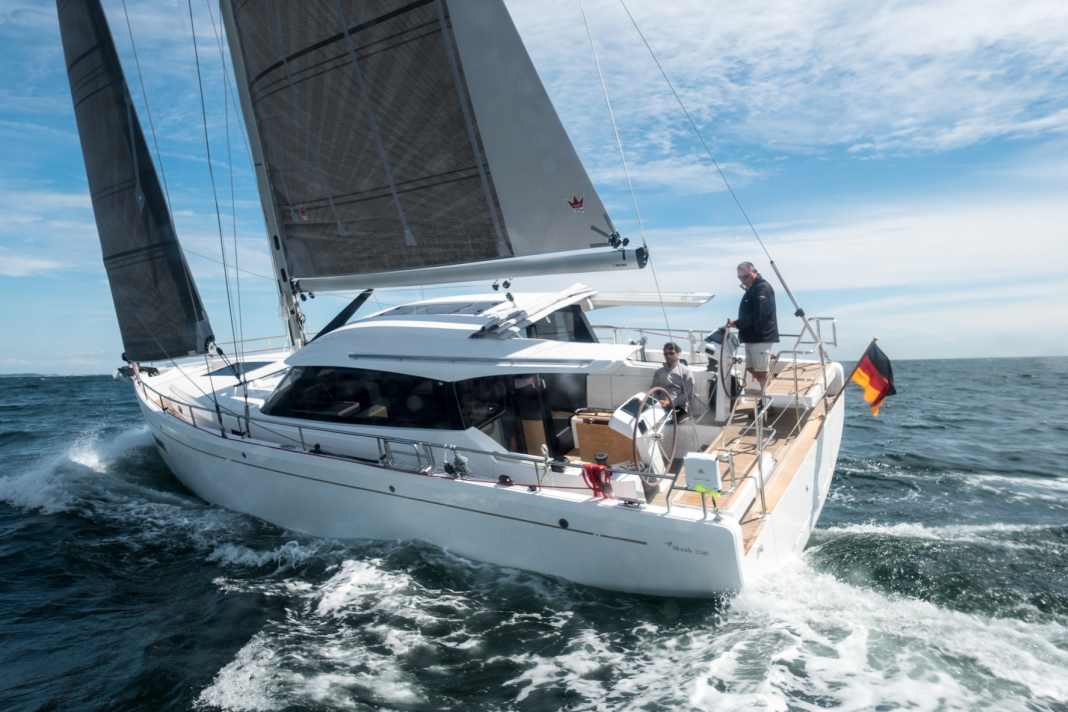



Rich in scope
The term deck saloon means a raised cabin structure with large window fronts and a raised seating area. In contrast to conventional yachts, an unobstructed view to the outside when sitting in the saloon is the key and mandatory element in the development of DS yachts. However, there does not really seem to be a patent recipe for this that the manufacturers can draw on. Rather, the interpretation of the theme is given free rein. It is significant how differently the manufacturers of the yachts tested approach the task of individualising the concepts and combining them with other advantages.
Moody has tackled the subject of the deck saloon with a bold, modern, but also rather unconventional plan. The basis is the seamless merging of saloon, cockpit, galley and navigation on one level. To achieve this, the cockpit has been lowered accordingly. The disadvantage is that it is no longer possible to extend the living area in the aft part of the boat.
Instead, the living areas are located in the front part of the boat on the lower level. The step forward is utilised here to integrate a so-called centre cabin a little way below the saloon in addition to the owner's cabin in the foredeck. Moody already realised this rather unusual concept over ten years ago with the DS 45 (test in YACHT 8/2008) and transferred it to the large, luxurious format with the DS 54 (YACHT 11/2014). Now, with the new Moody DS 41, the connection to the coveted twelve-metre class follows.
Expansion as required
The DS idea from Nordship, on the other hand, is completely different. The design by shipyard boss and owner Lars Buchwald envisages a more classic deck saloon configuration and also combines the construction with a centre cockpit, which is rather unusual. The difference in level between outside and inside is therefore much greater on this boat, which is accompanied by a functional separation of cockpit and saloon. A companionway connects the two areas of the ship. Nevertheless, the Nordship remains true to the general DS motto with its significantly raised seating area: all-round visibility while seated is also possible here.
Under the Danish yacht's high cockpit, there is enough space for a large, spacious master cabin with a central double bed - as is common on yachts with a centre cockpit. This sets the Nordship 380 DS apart from the competition in terms of living space below deck. However, there are still two double cabins, each with its own bathroom.
With the 40 DS, the Sirius shipyard has struck the happy medium. As with the Moody, the cockpit floor has been lowered slightly, but still leaves enough space underneath for another double cabin. Although the cockpit and saloon are not quite on the same level, they are still directly linked to each other in functional terms. The many windows in the rear bulkhead, which can also be opened, ensure transparency and good communication at eye level. Sirius also offers the option of integrating an additional centre cabin with a double bed under the raised deck saloon. This means that it can be extended with up to three sleeping areas, making it the only one of its kind in the test group.
In fact, while the Moody interior variants are limited to the choice of one or two toilet rooms, Sirius and Nordship offer an almost unmanageable variety of different interior design options for their models. In addition to the standard configurations and many defined versions, both manufacturers even offer their products as semi-customised projects. This means that all of the buyer's individual wishes are taken into account, if at all possible - for a corresponding surcharge, of course.
From modern to classic
There are major differences on the comparison boats in terms of the look below deck. The new Moody DS 41 is modern, bright and chic, with many bright surfaces, striking colour contrasts and relatively little visible wood. The style-conscious look fits very well in the deck saloon, which is glazed almost all round and flooded with light. The designers have also orientated the design of the living areas to the current zeitgeist and created a no-frills, light and airy living atmosphere. Unfortunately, the furnishings on the test ship, construction number 2, are not quite right in some places, with visibly inconsistent gaps. The floorboards also creak under load, which is annoying and somewhat detracts from the otherwise good and high-quality standard of the fittings.
The Nordship 380 DS again provides a stark contrast to the Moody's interior with its rather conservative interior design with lots of dark mahogany wood and curtains on the windows. Certainly, it's not unattractive, just a little old-school perhaps - on the other hand, the classically cosy and aisled interior design in typical Nordic style is still very popular. However, if you want a more modern design with light-coloured wood and less décor, you can also get what you want from Nordship - with a very high quality finish. The Danes use almost exclusively solid wood below deck, some of it moulded, and they only veneer doors and covers to save weight. All wooden furniture parts are individually cut to size and fitted by hand directly in the boat.
Sirius Yachts' standard of finish is almost legendary. The quality of the woodwork is first class and the finish is flawless down to the smallest detail. Solid wood is also predominantly used in the shipyard on Lake Plön, which is also fitted by hand directly in the ship being built. The fittings make an extremely robust impression and fit together perfectly without exception; you will look in vain for gaps or joints on the Sirius. This is boatbuilding craftsmanship at its very best.
Compromises in demand
In the comparatively slim foredeck of the Nordship, the double berth is built far into the bow, which restricts the sleeping area in the foot area, but offers all the more space with a width of 1.80 metres at shoulder height. The Moody and Sirius boats have island beds installed in the foredeck, which are somewhat narrower, although Sirius naturally has a whole range of alternatives to offer.
The Nordship also boasts impressive berth dimensions in the second double cabin. The berth in the spacious aft owner's cabin is no less than 1.84 metres wide at shoulder height (30 centimetres from the head). Although the berths in the centre cabins of the competitors are arranged in a square, they still offer less space for sleeping with double occupancy.
The galley of the Moody is not only the best place to work with spectacular all-round visibility, but also the most comfortable in comparison. The work surfaces here are larger and easier to utilise. When travelling in rough seas, however, you are somewhat lost in the open saloon of the Moody, and there are few places to hold on to. The galley units on the Sirius and Nordship, which are installed to the side in the passageway to the foredeck, offer more safety, as they are easier to hold on to for a good footing. The Nordship has the smallest galley with the smallest work surface, but it has the largest and most storage space thanks to the wall units.
However, the Sirius 40 DS remains the undisputed winner in terms of storage space below deck - there is not a single volume on board, however small, that has not been utilised for storage. Large cupboards, numerous drawers and spacious storage compartments under the floorboards keep the boat organised, even when fully loaded for the long journey. And on the Sirius, a walk-in technical room with a fully equipped workshop and additional storage space is standard, in different sizes depending on the layout.
The Moody DS 41 boasts a huge storage space under the saloon floor - a kind of basement, if you like - into which you can easily crawl. A washing machine could also be installed there. In the Nordship, the spacious and deep port side locker is not only accessible from the cockpit, but also from the inside through the aft cabin. On the test ship, however, around half of the huge volume is used in favour of a second toilet room aft - that is an option.
Into the second round
Apart from the basic idea of the deck saloon, the test subjects are hardly really comparable in terms of layout and cosiness below deck - which is precisely why the comparison is so exciting. In the second part of the deck saloon yacht comparison the three unequal competitors have to show what they can do under sail. Surprises cannot be ruled out.
Living comfort in figures
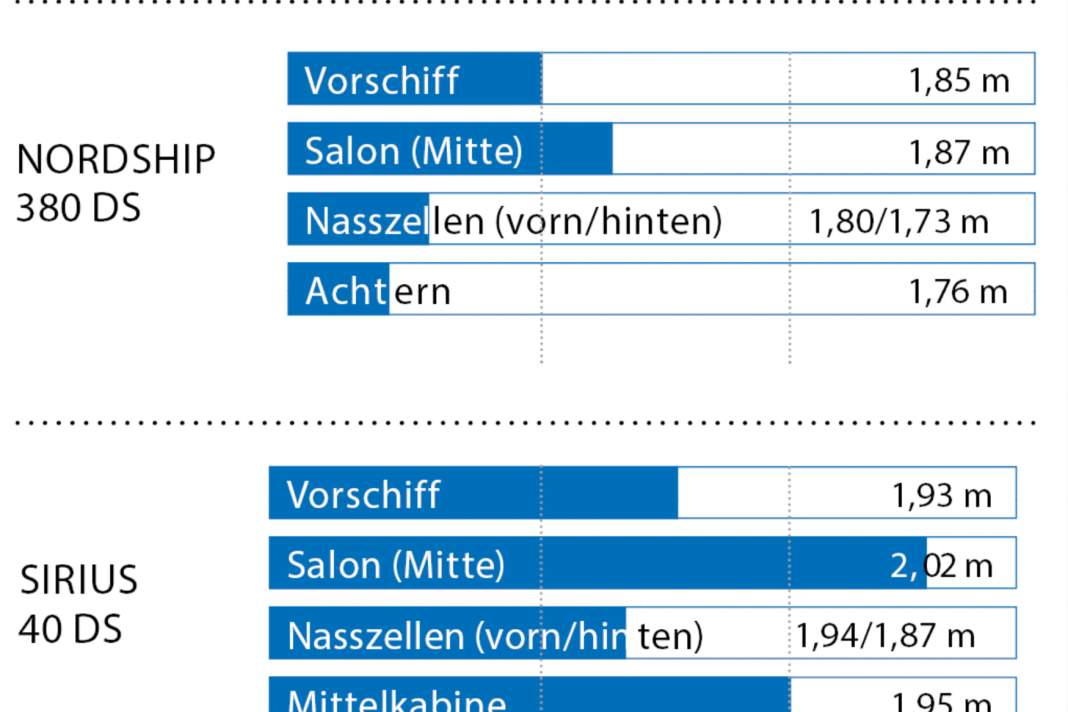



The Moody DS 41 in detail
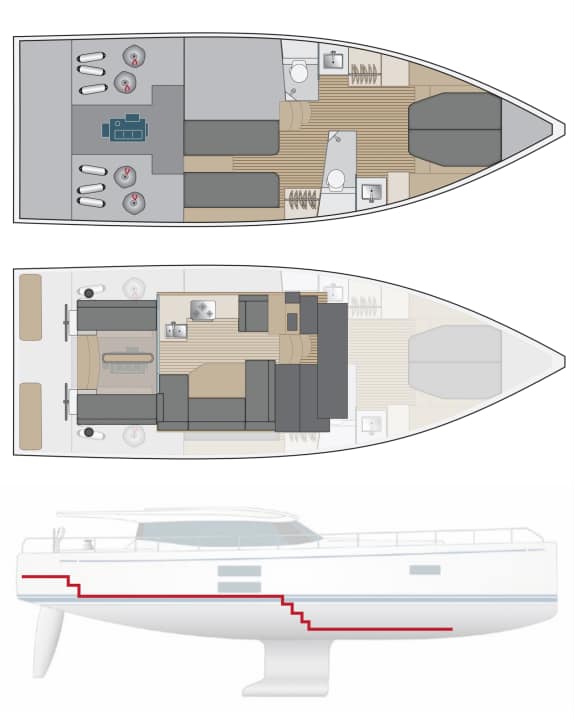
Technical data of the Moody DS 41
- Designer: Bill Dixon
- CE design category: A
- Torso length: 11,99 m
- Total length: 12,52 m
- Waterline length: 11,42 m
- Width: 4,20 m
- Draught/alternate..: 2,14/1,83 m
- Mast height above waterline: 19,92 m
- Theoretical torso speed: 8.21 kn
- Weight: 11,2 t
- Ballast/proportion: 3,1 t/28 %
- Mainsail: 45,0 m²
- Self-tacking jib: 38,0 m²
- machine (Yanmar): 42 kW/57 hp
- Fuel tank: 210 l
- Fresh water tank: 295 + 180 l
- Holding tanks: 2x 54 litres
Hull and deck construction
GRP sandwich laminate with balsa wood core, built by hand. Deck and bulkheads laminated
Price, shipyard and distribution
- Base price ex shipyard: 624,630 € gross incl. 19 % VAT.
As of 8/2024, how the prices shown are defined can be found here!
- Shipyard: Hanseyachts AG, 17493 Greifswald; www.hanseyachts.com
- Distribution: Dealer network
YACHT rating of the Moody DS 41
Very independent and innovative interpretation of the deck saloon idea. The functional combination of cockpit and saloon on one continuous level has many advantages. And the all-round visibility is simply stunning. Very modern interior design
Design and concept
- + Modern, bold DS interpretation
- + Cockpit and saloon on one level
- + Unrestricted all-round visibility
- - Narrow forward berth
Living and finishing quality
- + Bright, stylish living ambience
- + Lots of storage space in the cabins
- - Minor processing defects
- - Few holding options
The Nordship 380 DS in detail
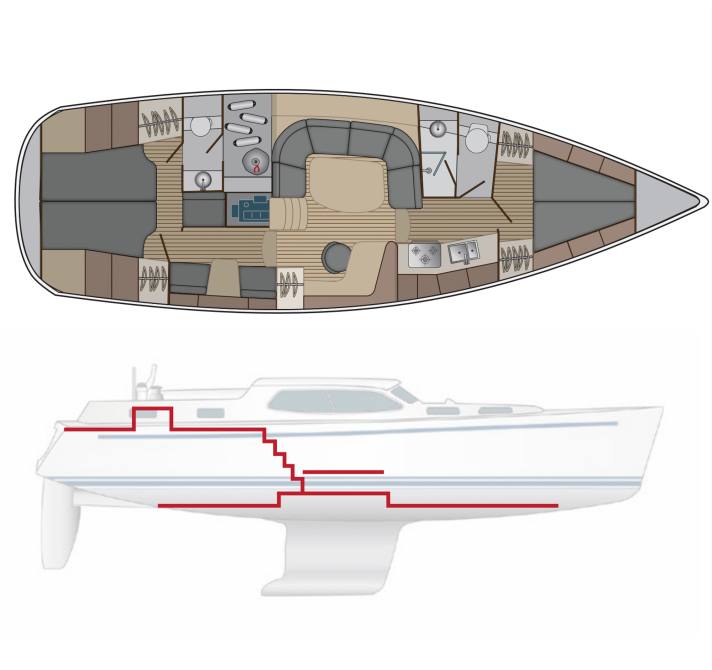
Technical data of the Nordship 380 DS
- Design engineer: Lars Buchwald
- CE design category: A
- Torso length: 11,60 m
- Total length: 12,30 m
- Waterline length: 10,30 m
- Width: 3,75 m
- Draught/alternate..: 1,80/2,00 m
- Mast height above waterline: 18,80 m
- Theoretical torso speed: 7.8 kn
- Weight: 9,0 t
- Ballast/proportion: 3,2 t/35 %
- Mainsail: 46,0 m²
- Self-tacking jib: 27,0 m²
- machine (Volvo Penta): 37 kW/50 hp
- Fuel tank: 200 l
- Fresh water tank: 2x 188 litres
- Holding tanks: 100 l
Hull and deck construction
GRP sandwich with balsa wood core, built by hand. Solid laminate below the waterline
Price, shipyard and distribution
- Base price ex shipyard: 635,740 € gross incl. 19 % VAT.
As of 8/2024, how the prices shown are defined can be found here!
- Shipyard and distribution: Nordship Yachts, 6640 Lunderskov (Denmark); www.nordship.dk
YACHT review of the Nordship 380 DS
a host of surprising and unusual details. The combination of deck saloon and centre cockpit is unique for yachts of this size. Below deck, the classic, typically Scandinavian fit-out standard dominates
Design and concept
- + More volume thanks to centre cockpit
- + Individual expansion options
- + Master cabin with large double berth
- - Cockpit and saloon remain separate
Living and finishing quality
- + Cosy evening salon
- + Large bunks in comparison
- - Rather conservative interior design
- - Comparatively low headroom
The Sirius 40 DS in detail
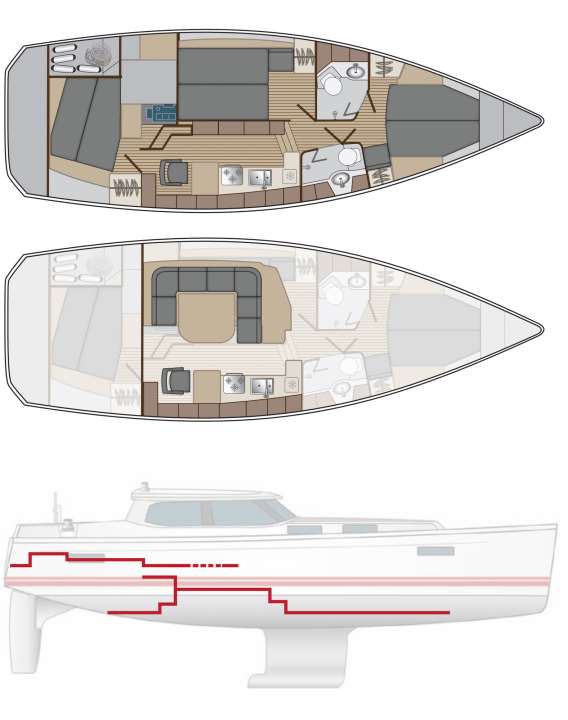
Technical data of the Sirius 40 DS
- Design engineer: Marc-Oliver v. Ahlen
- CE design category: A
- Torso length: 11,99 m
- Total length: 12,46 m
- Waterline length: 11,17 m
- Width: 4,00 m
- Draught/alternate..: 2,30/1,75, 2,00 m
- Mast height above waterline: 19,80 m
- Theoretical torso speed: 8.1 kn
- Weight: 11,0 t
- Ballast/proportion: 3,4 t/31 %
- Mainsail: 49,0 m²
- Self-tacking jib: 31,5 m²
- machine (Volvo Penta): 37 kW/50 hp
- Fuel tank: 315 l
- Fresh water tank: 515 l
- Holding tanks: 150 l
Hull and deck construction
GRP sandwich with Divinycell foam core, vacuum-bonded hand lay-up, full laminate below the waterline, bulkheads laminated to the hull and deck.
Price, shipyard and distribution
- Base price ex shipyard: 850,850 € gross incl. 19 % VAT.
As of 8/2024, how the prices shown are defined can be found here!
- Shipyard and distribution: Sirius-Werft GmbH, 24306 Plön/Holstein; www.sirius-werft.de
YACHT review of the Sirius 40 DS
The unusually high standard of fittings on the Sirius boat is just as impressive as the numerous customisation options available. The deck saloon concept works and offers plenty of living comfort
Design and concept
- + Coupling of saloon and cockpit
- + Numerous expansion options
- + Extension with up to three double cabins
- - Many levels, many steps
Living and finishing quality
- + Highest quality fit-out standard
- + Lots of storage space, good organisation
- + Technical room with workshop
Comparison of deck saloon yachts in the video
This article first appeared in YACHT 18/2020 and has been updated for this online version.

Michael Good
Editor Test & Technology
Michael Good is test editor at YACHT and is primarily responsible for new boats, their presentation and the production of test reports. Michael Good lives and works in Switzerland on the shores of Lake Constance. He has been sailing since childhood and, in addition to his professional activities, has also been an active regatta sailor for many years, currently mainly in the Finn Dinghy and Melges 24 classes. He is also co-owner of a 45 National Cruiser built in 1917. Michael Good has been working for the YACHT editorial team since January 2005 and has tested around 500 yachts, catamarans and dinghies in that time.

